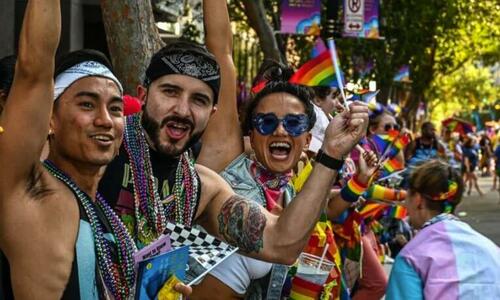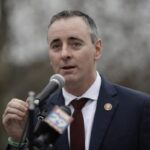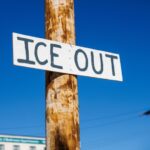
Authored by Naveen Anthrapully via The Epoch Times,
The U.S. Centers for Disease Control and Prevention (CDC) has issued a warning that incidents of monkeypox (mpox) infections could rise in the coming months as LGBT festivals attract large crowds.
In its May 17 risk assessment, the CDC warned that there is a “substantial” risk of renewed monkeypox outbreaks across the United States, given the recent uptick in cases in Chicago, which began in mid-April. At present, gay, bisexual, and other men who have sex with men (MSM) account for the majority of monkeypox cases in the United States.
“The risk of outbreaks could further increase as people gather this spring and summer for festivals and other events with high potential for skin-to-skin contact or increased sexual activity,” the agency stated.
“Large gatherings were a significant source of exposure and geographic spread of mpox in 2022.”
Between April 17 and May 5, a total of 12 confirmed cases and one probable case of monkeypox were reported to the Chicago Department of Public Health. All cases were among symptomatic men.
CDC advised MSM and transgender people who engage in sex with men to remain updated about the latest monkeypox news.
The agency asked LGBT individuals to get vaccinated in case they are at risk of monkeypox exposure, follow safer sex and social gathering practices, and avoid close, skin-to-skin contact with individuals who have a new or unexplained rash.
Monkeypox Vaccine
In a May 18 tweet, Demetre Daskalakis, deputy head of the White House monkeypox task force, said, “If you are a gay bisexual or other same gender loving man or a transgender or gender-diverse person who could benefit, get vaccinated.”
Currently, two doses of the Jynneos vaccine are being recommended for monkeypox. According to the CDC, Jynneos is “highly effective” at preventing and reducing the severity of monkeypox.
However, the vaccine is “not 100 percent effective.” CDC expects cases after vaccination to have “less severe illness” compared to unvaccinated individuals, based on data from the United States.
However, the agency also points out that it has observed “an increasing proportion of fully vaccinated individuals among cases over the last several months, including the majority of cases in two recent small clusters in Chicago and France.
“Given the vaccine does not fully protect against mpox, it is possible that a large proportion of cases could occur among vaccinated persons where vaccination coverage—but also sexual activity—is high among affected populations,” it said.
Daskalakis insists that even if the vaccine does not prevent infection, “it prevents #mpox complications.” He advised LGBTQ people to get both doses of the vaccine.
According to the CDC, the Jynneos vaccine effectively prevents monkeypox 95 percent of the time. However, the vaccine’s effectiveness is unknown when it comes to individuals whose immune systems have been compromised.
This is critical since more than 50 percent of monkeypox cases in the United States have been among people identified as HIV positive.
Serious health conditions have been reported among the vaccinated at the rate of 22 per 1 million individuals. Such conditions include myocarditis, an inflammation of the heart muscle, and pericarditis, an inflammation of the fluid around the heart.
Monkeypox in US
In the United States, 30,401 monkeypox cases and 42 deaths have been recorded as of May 17. At present, daily infections average in the single digits, a far cry from the peak of July-August last year when there used to be 300 to 400 cases and even more every day.
The vast majority of cases have been identified among men aged 21 to 55 years, with females accounting for only a small number, according to the CDC.
California tops the list of states with the highest number of monkeypox infections, accounting for 5,759 cases, nearly 19 percent of the total number of cases in the country.
New York comes second with 4,250 cases, Texas at third with 3,007, followed by Florida, Georgia, and Illinois. Twenty-six states had cases in triple digits.
In the United States, roughly 1.2 million Jynneos vaccines have been administered since the outbreak, which began in May 2022. The CDC estimates that 23 percent of the estimated population at risk for monkeypox have been fully vaccinated.
Authored by Naveen Anthrapully via The Epoch Times,
The U.S. Centers for Disease Control and Prevention (CDC) has issued a warning that incidents of monkeypox (mpox) infections could rise in the coming months as LGBT festivals attract large crowds.
In its May 17 risk assessment, the CDC warned that there is a “substantial” risk of renewed monkeypox outbreaks across the United States, given the recent uptick in cases in Chicago, which began in mid-April. At present, gay, bisexual, and other men who have sex with men (MSM) account for the majority of monkeypox cases in the United States.
“The risk of outbreaks could further increase as people gather this spring and summer for festivals and other events with high potential for skin-to-skin contact or increased sexual activity,” the agency stated.
“Large gatherings were a significant source of exposure and geographic spread of mpox in 2022.”
Between April 17 and May 5, a total of 12 confirmed cases and one probable case of monkeypox were reported to the Chicago Department of Public Health. All cases were among symptomatic men.
CDC advised MSM and transgender people who engage in sex with men to remain updated about the latest monkeypox news.
The agency asked LGBT individuals to get vaccinated in case they are at risk of monkeypox exposure, follow safer sex and social gathering practices, and avoid close, skin-to-skin contact with individuals who have a new or unexplained rash.
Monkeypox Vaccine
In a May 18 tweet, Demetre Daskalakis, deputy head of the White House monkeypox task force, said, “If you are a gay bisexual or other same gender loving man or a transgender or gender-diverse person who could benefit, get vaccinated.”
Currently, two doses of the Jynneos vaccine are being recommended for monkeypox. According to the CDC, Jynneos is “highly effective” at preventing and reducing the severity of monkeypox.
However, the vaccine is “not 100 percent effective.” CDC expects cases after vaccination to have “less severe illness” compared to unvaccinated individuals, based on data from the United States.
However, the agency also points out that it has observed “an increasing proportion of fully vaccinated individuals among cases over the last several months, including the majority of cases in two recent small clusters in Chicago and France.
“Given the vaccine does not fully protect against mpox, it is possible that a large proportion of cases could occur among vaccinated persons where vaccination coverage—but also sexual activity—is high among affected populations,” it said.
Daskalakis insists that even if the vaccine does not prevent infection, “it prevents #mpox complications.” He advised LGBTQ people to get both doses of the vaccine.
According to the CDC, the Jynneos vaccine effectively prevents monkeypox 95 percent of the time. However, the vaccine’s effectiveness is unknown when it comes to individuals whose immune systems have been compromised.
This is critical since more than 50 percent of monkeypox cases in the United States have been among people identified as HIV positive.
Serious health conditions have been reported among the vaccinated at the rate of 22 per 1 million individuals. Such conditions include myocarditis, an inflammation of the heart muscle, and pericarditis, an inflammation of the fluid around the heart.
Monkeypox in US
In the United States, 30,401 monkeypox cases and 42 deaths have been recorded as of May 17. At present, daily infections average in the single digits, a far cry from the peak of July-August last year when there used to be 300 to 400 cases and even more every day.
The vast majority of cases have been identified among men aged 21 to 55 years, with females accounting for only a small number, according to the CDC.
California tops the list of states with the highest number of monkeypox infections, accounting for 5,759 cases, nearly 19 percent of the total number of cases in the country.
New York comes second with 4,250 cases, Texas at third with 3,007, followed by Florida, Georgia, and Illinois. Twenty-six states had cases in triple digits.
In the United States, roughly 1.2 million Jynneos vaccines have been administered since the outbreak, which began in May 2022. The CDC estimates that 23 percent of the estimated population at risk for monkeypox have been fully vaccinated.
Loading…





